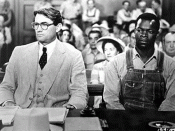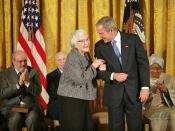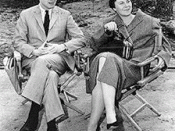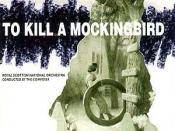Scout Finch: a change affects the way she feels and acts toward others and reforms her from a child to a girl with experience, wisdom, and etiquette beyond her eight years. In the novel, To Kill A Mockingbird by Harper Lee, this young girl's self-centeredness dissipates through her observations and interactions with others in her childhood town of Maycomb.
At the novel's beginning, Scout Finch is your typical child: She whines and complains. Also, she is especially critical of others, including strangers. A man by the name of Arthur Radley, the mysterious neighborhood recluse whom she refers to as "Boo"ÃÂ, is picked on repeatedly by Scout and her playmates. The children harass the poor man by sneaking around his residence full of pranks and telling stories about his "evil"ÃÂ ways. She is also quite uneccepting to her first grade teacher and Walter Cunningham, both of whom she gives a difficult time to on the first day of school.
She also acts in a rather impulsive nature - picking fights with anyone who utters a bad word to her name in order to defend her ego.
However, this young girl has a reformation in which her concern for the feelings of others grew. This can be led to her honorable father Atticus, who does his best to teach his daughter right from wrong, focusing on her getting along and being a lady to others. His best advice was for her to "walk around in another's shoes"ÃÂ. Also, throughout the novel, his encounters with people show the impressionable Scout to remain under control even when your patience is tested. Jem, her brother and favorite playmate, also tries to train her by stopping her schoolyard fights and petty arguments. Still, the major factor that reforms her ways was the trial of the black Tom Robinson. First of all, she saw her father take a dangerous position to defend a man of color. She also realized that people can't see past the color of a man's skin, even if he is truthful and honest. She saw the true aspects of human nature and Atticus as a hero. Boo Radley, teaches her not to judge a person whom you do not know, being that when she meets him he turns out to be very kind and gentle. He is completely opposite of Scout's initial impression.
At the end, Scout is seen in a new light: a precocious young girl who understands people and herself. She has a deeper respect for the kind, gentle, and heroic Atticus and puts his teachings to good use.
In conclusion, Scout has grown older and wiser through these interactions with people and learned lessons for the better.
Scout Finch: a change affects the way she feels and acts toward others and reforms her from a child to a girl with experience, wisdom, and etiquette beyond her eight years. In the novel, To Kill A Mockingbird by Harper Lee, this young girl's self-centeredness dissipates through her observations and interactions with others in her childhood town of Maycomb.
At the novel's beginning, Scout Finch is your typical child: She whines and complains. Also, she is especially critical of others, including strangers. A man by the name of Arthur Radley, the mysterious neighborhood recluse whom she refers to as "Boo"ÃÂ, is picked on repeatedly by Scout and her playmates. The children harass the poor man by sneaking around his residence full of pranks and telling stories about his "evil"ÃÂ ways. She is also quite uneccepting to her first grade teacher and Walter Cunningham, both of whom she gives a difficult time to on the first day of school. She also acts in a rather impulsive nature - picking fights with anyone who utters a bad word to her name in order to defend her ego.
However, this young girl has a reformation in which her concern for the feelings of others grew. This can be led to her honorable father Atticus, who does his best to teach his daughter right from wrong, focusing on her getting along and being a lady to others. His best advice was for her to "walk around in another's shoes"ÃÂ. Also, throughout the novel, his encounters with people show the impressionable Scout to remain under control even when your patience is tested. Jem, her brother and favorite playmate, also tries to train her by stopping her schoolyard fights and petty arguments. Still, the major factor that reforms her ways was the trial of the black Tom Robinson. First of all, she saw her father take a dangerous position to defend a man of color. She also realized that people can't see past the color of a man's skin, even if he is truthful and honest. She saw the true aspects of human nature and Atticus as a hero. Boo Radley, teaches her not to judge a person whom you do not know, being that when she meets him he turns out to be very kind and gentle. He is completely opposite of Scout's initial impression.
At the end, Scout is seen in a new light: a precocious young girl who understands people and herself. She has a deeper respect for the kind, gentle, and heroic Atticus and puts his teachings to good use.
In conclusion, Scout has grown older and wiser through these interactions with people and learned lessons for the better.





